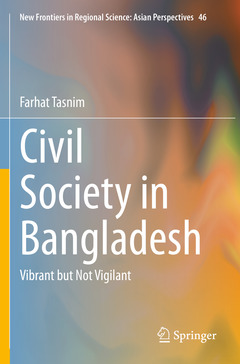Civil Society in Bangladesh , 1st ed. 2021 Vibrant but Not Vigilant New Frontiers in Regional Science: Asian Perspectives Series, Vol. 46

Farhat Tasnim's book is a comprehensive treatment of civil society in Bangladesh. It will serve as a useful resource for future researchers in this field for a long time to come.
Harry Blair, Yale University, USA
Farhat Tasnim provides in this book a new perspective on one of the essential cases of civil society study, Bangladesh. Her penetrating analysis of the relationship of civil society organizations and democracy in Bangladesh should attract a wide readership. This is an important book not only for students of Bangladesh, but for scholars and practitioners interested in the relationship of civil society organizations and democracy.
Robert J. Pekkanen, University of Washington, USA
Farhat Tasnim is a Professor of Political Science at the University of Rajshahi, Bangladesh. She received her Ph.D from the University of Tsukuba, Japan and was awarded the Japan Society for Promotion of Science Foreign Scholars Fellowship to conduct post-doctoral research at the same university. Her research interest covers, civil society, community participation, democracy and sustainable development. She contributed research articles and book reviews in refereed journals by leading publishers. Professor Tasnim supervises graduate students, mostly in the field of civil society, governance and democracy and offers courses in International Politics, Political Theory, Civil Society and NGOs, Social Research Methodology at Graduate and Post-graduate levels.
Goes beyond treating NGOs as the only CSOs and considers all types of traditional, conventional, and modern associations and organizations to broadly assess their influence on development and democracy in a developing country like Bangladesh
Targets, professors, researchers, and students who are interested in civil society in Bangladesh, South Asia, and other areas
Serves as a text and resource book for courses in South Asia, development, and civil Society as well as for research
Date de parution : 02-2022
Ouvrage de 187 p.
15.5x23.5 cm
Disponible chez l'éditeur (délai d'approvisionnement : 15 jours).
Prix indicatif 126,59 €
Ajouter au panierDate de parution : 02-2021
Ouvrage de 187 p.
15.5x23.5 cm
Thème de Civil Society in Bangladesh :
Mots-clés :
Civil Society; Neo-Tocquevilean Theory; Democracy; Participation; Vigilance



